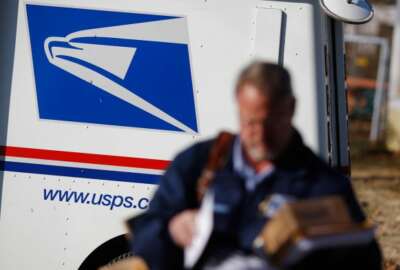USPS seeks ability to gather COVID-19 vaccination, testing data from workforce
The Postal Service is laying the groundwork to track the vaccination and testing status of its workforce amid the COVID-19 pandemic, or any future public health...
The Postal Service is laying the groundwork to track the vaccination and testing status of its workforce amid the COVID-19 pandemic, or any future public health emergency.
USPS, however, says it’s only giving notice as it prepares for “potential future contingencies,” and is not, at this time, updating its COVID-19 vaccine or testing requirements, nor is it seeking to collect data on the vaccination status of its workforce.
A Supreme Court ruling last month struck down the Biden administration’s mandate for large employers, including USPS, to ensure their workers are fully vaccinated against COVID-19, or require non-vaccinated employees to wear face masks and be subject to weekly COVID-19 tests.
USPS, however, appears unwilling to rule out the possibility that it could eventually face vaccination or testing requirements.
Federal Register notice published Wednesday, said it’s looking to modify its system of records “to track and record vaccination status or employee attestation in lieu of acceptable proof of vaccination status as applicable, related to an ongoing pathogenic public health crisis, including the COVID-19 pandemic.”
USPS said in the notice that it’s looking to revise its emergency management records “to facilitate effective preparedness and response to potential emerging public health crises and other emergency events that may impact Postal Service employees and operations in the working environment.”
USPS, in its rationale for the proposed change, said the emergence of COVID-19 in early 2020 “identified the need for [a] robust set of policies and practices to ensure operational continuity and employee safety amidst an emergency event, while also protecting individual privacy.”
USPS spokeswoman Darlene Casey told Federal News Network on Wednesday that “the Postal Service is not updating its COVID-19 vaccine or testing requirements as part of this notice, nor are we seeking to collect information on the vaccination status of our employees.”
“We have taken steps to update our systems of records to prepare for potential future contingencies and we continue to review and evaluate OSHA’s ongoing rulemaking process,” Casey said.
The USPS notice is an interesting development for the agency, which was subject to the Occupational Safety and Health Administration’s now-defunct Emergency Temporary Standard (ETS), and warned that meeting those requirements could potentially result in a “dramatic loss of employees.”
The Supreme Court last month struck down OSHA’S vaccination-and-testing requirements for large companies with more than 100 employees. The court, however, allowed the Biden administration to proceed with a vaccine mandate for most health care workers in the U.S.
USPS isn’t covered under the Biden administration’s vaccine mandate for the federal workforce, which has also run into some legal challenges. A Texas-based federal judge on Jan. 21. blocked the administration from enforcing that mandate.
More recently, a federal appeals court last week declined, for now, to overturn the federal court’s injunction on the vaccine mandate for the federal workforce.
The Biden administration, however, through its Safer Federal Workforce Task Force, has interpreted that the Texas federal court’s ruling does not prevent agencies from gathering information on the vaccination status of their employees — even if those agencies are currently unable to enforce the mandate.
The Safer Federal Workforce Task Force, in updated guidance on Jan. 24, said agencies covered under President Joe Biden’s executive order signed last September “can continue to require and receive the submission of vaccination information and documentation” from federal employees and prospective employees who have received a job offer.
Despite these recent developments, USPS appears to be preparing to be able to collect COVID-19-related information from its employees, on the off chance that it could eventually face vaccination or testing requirements.
The Labor Department, following the Supreme Court’s ruling, withdrew OSHA’s vaccine-and-testing mandate for large employers “as an enforceable emergency temporary standard.”
But as GovExec first reported last month, Labor specified that the ETS still remains on the table as a proposed rule that’s still active as part of the rule-making process.
“Although OSHA is withdrawing the Vaccination and Testing ETS as an enforceable emergency temporary standard, OSHA is not withdrawing the ETS to the extent that it serves as a proposed rule” under the 1970 Occupational Safety and Health Act, the agency wrote in a Jan. 26. Federal Register notice.
Beyond COVID-19 and “pathogenic public health crises,” USPS is also looking to expand its definition of emergency events, as it pertains to its system of records, to include natural disasters, human-caused disasters, acts of terrorism and cybersecurity incidents.
USPS said these changes to its system of records will give the agency greater flexibility to prepare for and respond to a wide array of emergencies.
But among the categories of individuals affected by this proposed change, USPS said its system of records will cover “Postal Service employees who provide the Postal Service with acceptable proof of COVID-19 vaccination status or, in the alternative, weekly COVID-19 testing results (or test results prior to return to physical postal facilities or workplaces).”
USPS, in its notice, also proposes gathering, via a software application, information from its employees, including employee identification numbers, vaccination status, vaccine date, images showing proof of vaccine, vaccine exemption status, vaccine exemption reason and the status of COVID-19 test results.
The proposed changes to the USPS system of records would “allow an employee to record their COVID-19 vaccination status and COVID-19 testing status through mobile and web-based applications.”
USPS is also proposing to disclose COVID-19 vaccine documentation, any test results, or any “work-related COVID-19 fatalities and hospitalizations” to OSHA.
USPS said it sent the proposed changes to its system of records to Congress and the Office of Management and Budget for their evaluation, adding that it does not expect its amended system of records will have “any adverse effect on individual privacy rights.”
The 1974 Privacy Act requires agencies to very clearly define any “routine use” they intend to make with the information in their record-keeping systems about specific individuals. The Privacy Act also requires agencies to give public notice of these changes through the Federal Register.
Prior to the Supreme Court’s ruling on OSHA’s vaccination-and-testing requirements for large employers, USPS asked the agency for a 120-day temporary exemption from its vaccine-and-testing requirements.
USPS, in its letter, told OSHA it would be “nearly impossible,” to meet the deadlines outlined in its ETS under normal circumstances, but found them especially taxing to meet during its peak season, which runs from mid-October through January.
USPS said that complying with the OSHA mandate “is likely to result in the loss of many employees,” either through workers leaving the agency or facing discipline for non-compliance.
The agency predicted the biggest drop-off in staffing would occur among temporary employees brought on to handle a surge in mail and packages during its peak season.
“While the impact to our service could be devastating any time of year, requiring the Postal Service to absorb what could inevitably be a dramatic loss of employees at a time when the labor market is extremely tight and in the middle of the Postal Service’s peak season would have a potentially catastrophic impact on our ability to provide service to the American public when demand is at its highest,” USPS wrote.
Copyright © 2025 Federal News Network. All rights reserved. This website is not intended for users located within the European Economic Area.
Jory Heckman is a reporter at Federal News Network covering U.S. Postal Service, IRS, big data and technology issues.
Follow @jheckmanWFED






